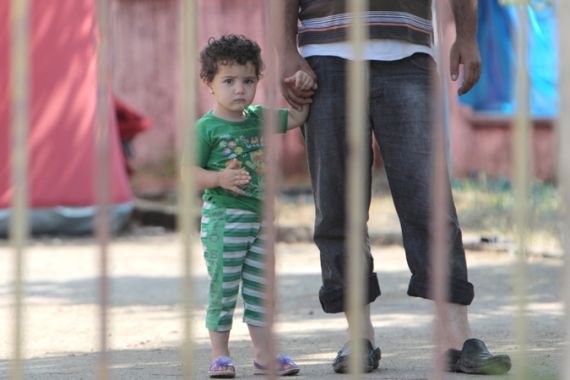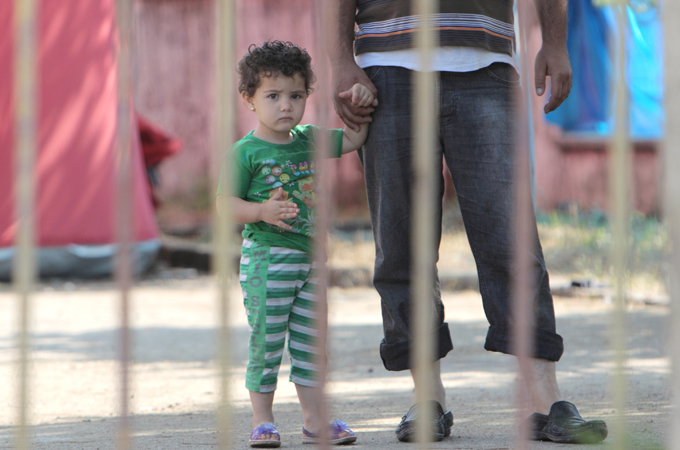Syria’s humanitarian crisis intensifies
The humanitarian crisis in Syria worsens as the UN Security Council remains unwilling – or unable – to act.

 |
| As many as 7,000 Syrians from Jisr al-Shughur have sought refuge in Turkey, after helicopter gunships were reportedly used against the town’s 50,000 residents [EPA] |
When reports of protests and subsequent civilian deaths as security forces fired on protestors began filtering in from the southern Syrian city of Deraa in March, many wondered what turn events would take in both Syria and the international community in the wake of earlier uprisings during the “Arab Spring”.
Since then, events have continued taking turns for the worse, but this week has marked a crucial point in both the increasingly dire humanitarian crisis and the lack of response from the United Nations Security Council.
On Sunday, Syrian forces moved into the northwestern town of Jisr al-Shughur, after the government claimed that “armed gangs” had killed at least 120 security forces and soldiers there in early June.
Now, at least 7,000 Syrians from the town and surrounding areas have fled to Turkey seeking safety, according to the UN Office of the High Commissioner for Human Rights (OHCHR). Reports from other sources ranged from 5,000 to 8,500.
Lack of media coverage
The OHCHR stated in a preliminary report that helicopter gunships were said to have been used on Jisr al-Shughur and its population of approximately 50,000 people.
Nadim Houry, senior researcher at Human Rights Watch (HRW), told IPS from Beirut that once they reached Turkey, Syrian refugees were well cared for in camps set up by the Turkish International Red Crescent, and had access to food and medical treatment.
What is problematic is that the Turkish government does not want these refugees to speak to the media, Houry said. In Syria, as well, a lack of media access – the government has forbidden journalists from entering the country – has challenged efforts to verify accounts of what has taken place over the past three months.
Houry emphasised that those who fled their homes but remain in Syria are far less fortunate than their counterparts in Turkey, living under circumstances “much more precarious” and enduring heavy rain under makeshift tents of plastic sheeting, some sources say.
Of these Syrians, some wait to enter Turkey as the International Red Crescent constructs more camps. Others wait to return to their homes.
UN Secretary General Ban Ki-Moon has praised the Turkish government for its generosity and declared that the UN remains “ready to assist” if requested by Turkish authorities.
Other refugees have gathered in Lebanon and Jordan, but those populations are smaller and are mainly living with extended families, having fled Syria before this past week. In Lebanon, numbers of refugees have not been “overwhelming”, and “conditions are fine”, Houry told IPS.
Situation ‘very worrisome’
Over 1,200 people, most of them civilians, have been killed in the violent suppression of protests that began in March, and more than 10,000 have been detained.
Navi Pillay, UN High Commissioner for Human Rights, condemned the crackdown, calling it “utterly deplorable for any government to attempt to bludgeon its population into submission, using tanks, artillery and snipers”. Ban called the situation in Syria “very worrisome”.
Pillay’s repeated requests to Syrian authorities that they allow a fact-finding mission into Syria have gone ignored. But OHCHR proceeded with research anyway and published a preliminary report on Wednesday, concluding that recent events in Syria constitute “alleged breaches of the most fundamental rights”.
The report’s laundry list of “widespread human rights violations” included “violated freedoms of assembly, expression and movement”, “excessive use of force in quelling demonstrators, arbitrary detentions, summary executions, torture and other cruel or inhuman treatment”.
The report also documented that “Syrian security forces directly blocked the distribution of critical food supplies in certain locations”, depriving Syrians of basic food resources.
Meanwhile, the UN Security Council has balked at passing a resolution, drafted last week by Britain, to condemn the crackdown and human rights violations.
Certain countries, such as Russia and China, oppose the resolution on the grounds that it could provide justification for military intervention. Member states are being cautious as a previous Security Council resolution on Libya was used to justify NATO intervention there.
Analysts have also cited Russia and China’s military and economic ties with Syria as reasons for their opposition. According to Houry, South Africa, Brazil, and India are also “hesitant” to endorse a resolution, fearing that it will only contribute to further instability in Syria.
But while the Security Council dawdles, what Houry calls “a systematic pattern of repression” continues, leaving destruction and suffering in its wake. “The fact that the Security Council cannot speak up with one voice … is prolonging the situation,” he said.
As the situation deteriorates, Houry’s outlook was not hopeful: Protests are not what is provoking the violence, he explained. “I think it’s the fact that there are now people who are completely opposed to President Assad and to the Ba’th Party. And in a one-party state, that sort of dissent is not tolerated.”
A version of this article first appeared on the Inter Press Service News Agency.